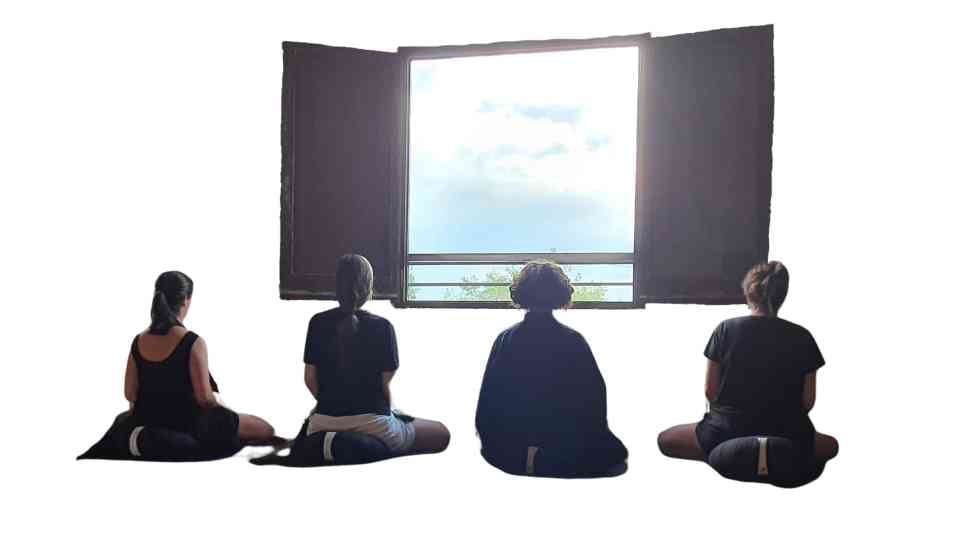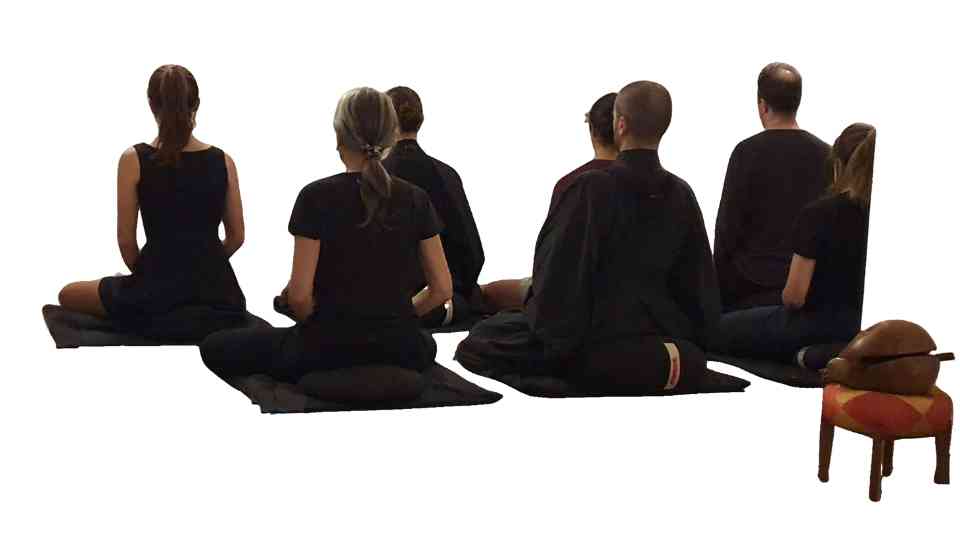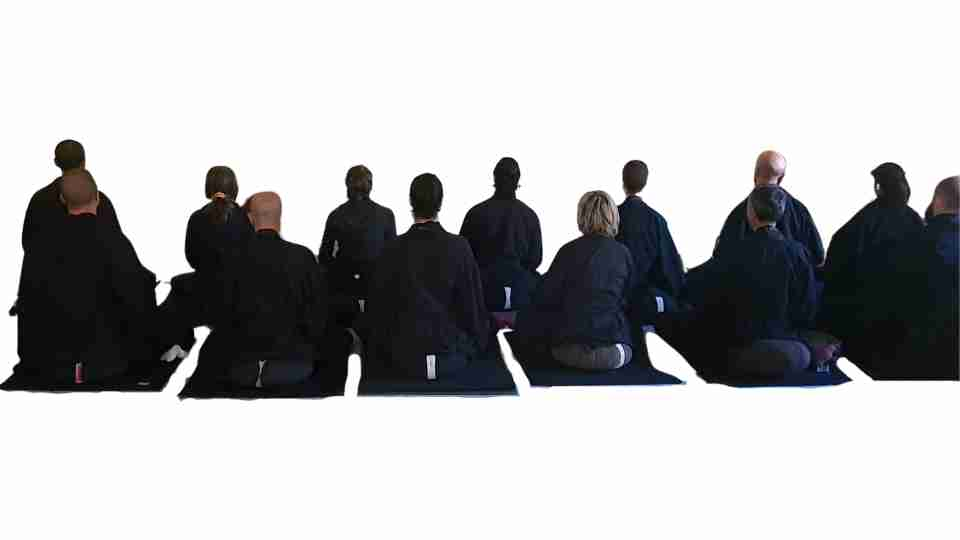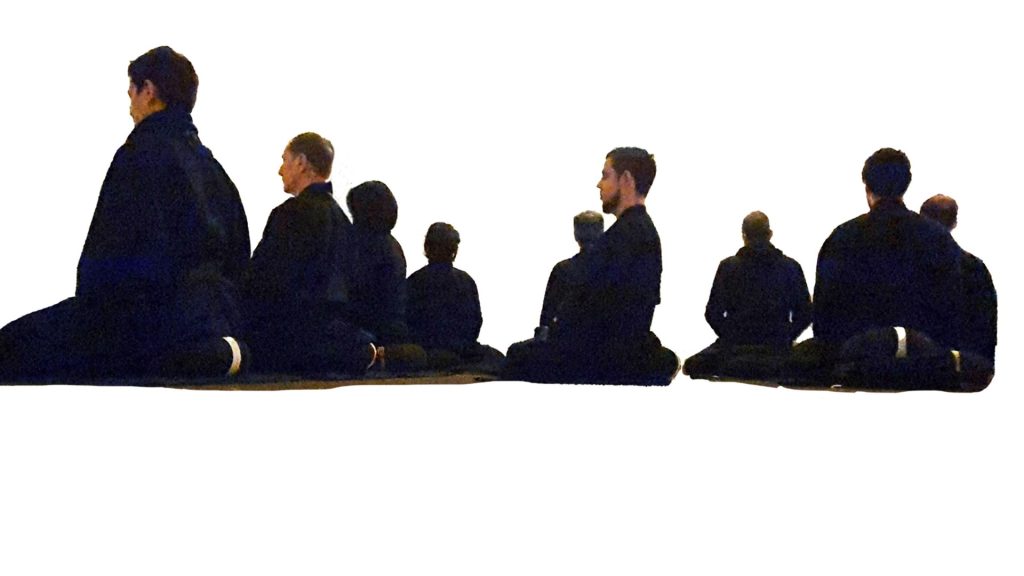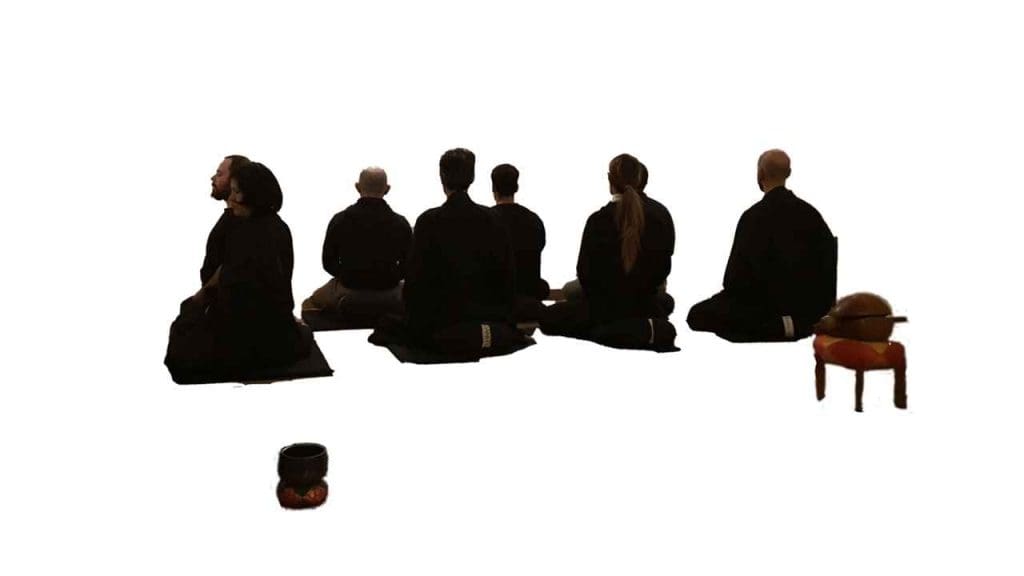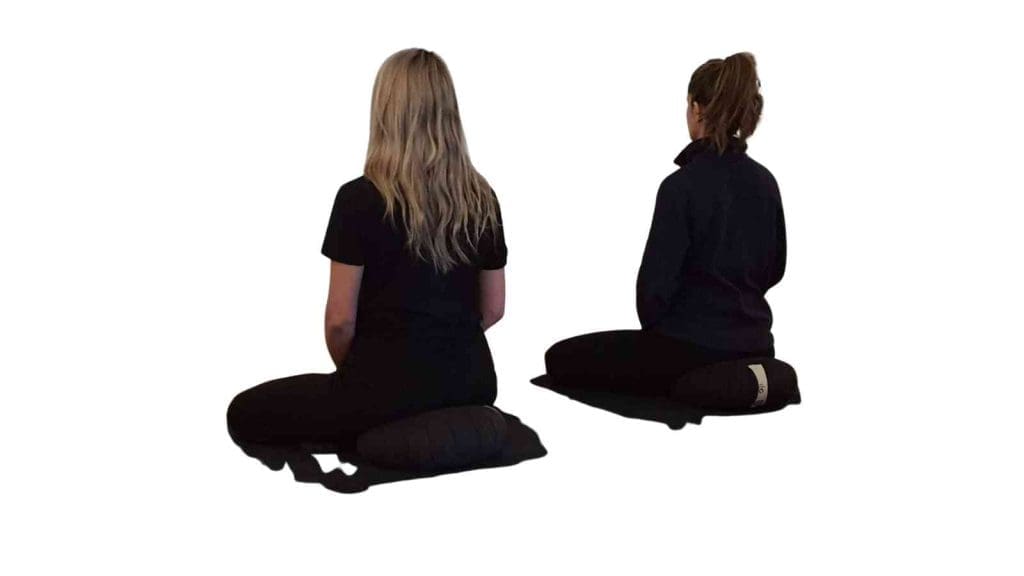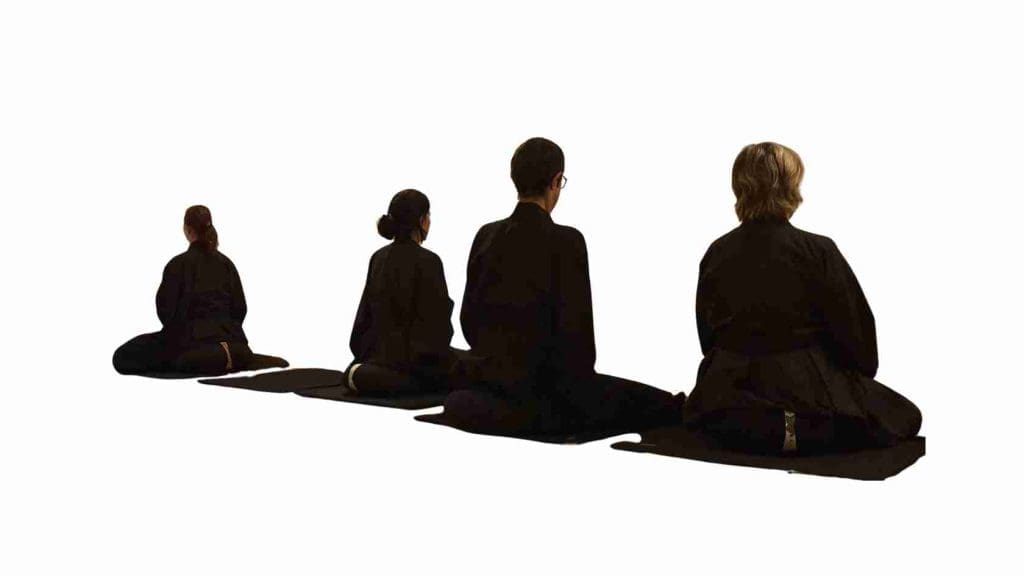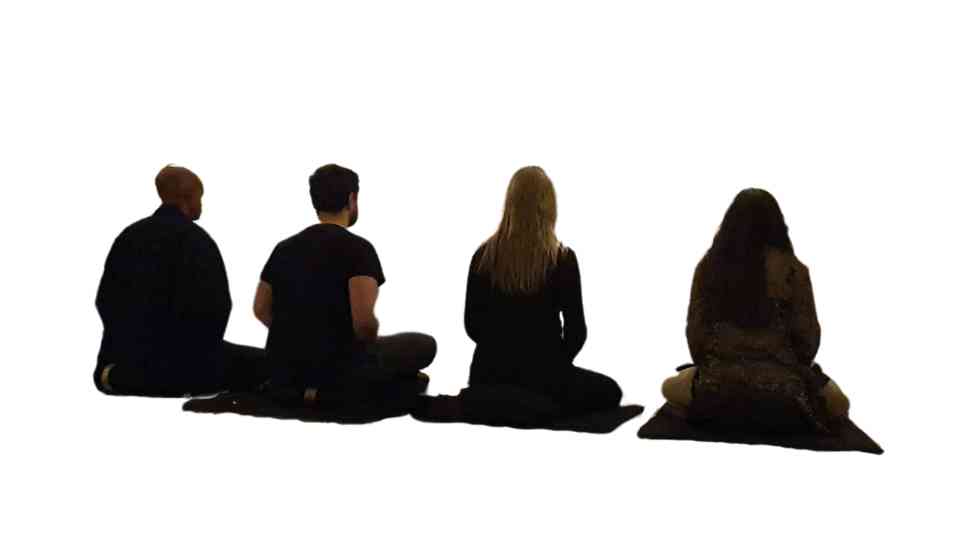Zen meditation retreat in the mountains
The Zen meditation retreat is a few days of practice. It takes place in a countryside house, surrounded by nature. During the sesshin, we practice Zen meditation intensively. The rest of the activities are done with full awareness and in silence.
In this way, we can unite the Zen mind, which is serene and concentrated, with our daily life. In this sense, we learn to do this directly and intuitively, simply by following the practice in each moment.
Good for meditators to attend retreats regularly. This helps to keep daily meditation from becoming stagnant. Thus, meditation remains a valuable and meaningful activity.
The Zen meditation retreat is led by Master Lluís Nansen Salas. He will guide us through intense practice and help us face the obstacles of the mind.
Zen meditation retreats, or sesshin, are held in the countryside. They take place at Mas Curtius, in Lluçà, where we are in direct contact with nature.
What should you bring to the retreat?
You should bring: zafu, zabuton; loose, dark clothing to sit comfortably in meditation, a bowl, a spoon, two large napkins, and a small white napkin, along with sheets and a pillowcase, or a sleeping bag.
You must reserve a spot by filling out the form below on this page, or contact us
Urban Zen Meditation Retreat
The urban Zen meditation retreat consists of a few days of meditation practice at the Zen Kannon center in the city of Barcelona.
During these days, we practice meditation and various activities in silence and with full attention, or mindfulness. Special focus is placed on breath awareness and the attitude of the mind during Zen meditation.
Similarly, you can attend the retreat fully or partially, and in this sense, it is possible to join at different scheduled times, arriving 20 minutes before each session.
You must reserve a spot by filling out the form on this page, or contact us, specifying your preferred entry time.
Can the urban retreat be done partially, or must it be done entirely?
The urban meditation retreat can be done both in-person and online, either partially or in its entirety. Designed so that everyone can participate in the intensive meditations, regardless of their circumstances.
If I’m still a beginner, can I participate in an urban meditation intensive?
Yes, the urban intensive is a great way to start with this practice. In this sense, the city intensive is ideal. It allows beginners and other practitioners to introduce themselves to the retreat practice.
Additionally, it adapts to your current level of preparation. Learn to meditate and start experiencing the benefits of meditation.
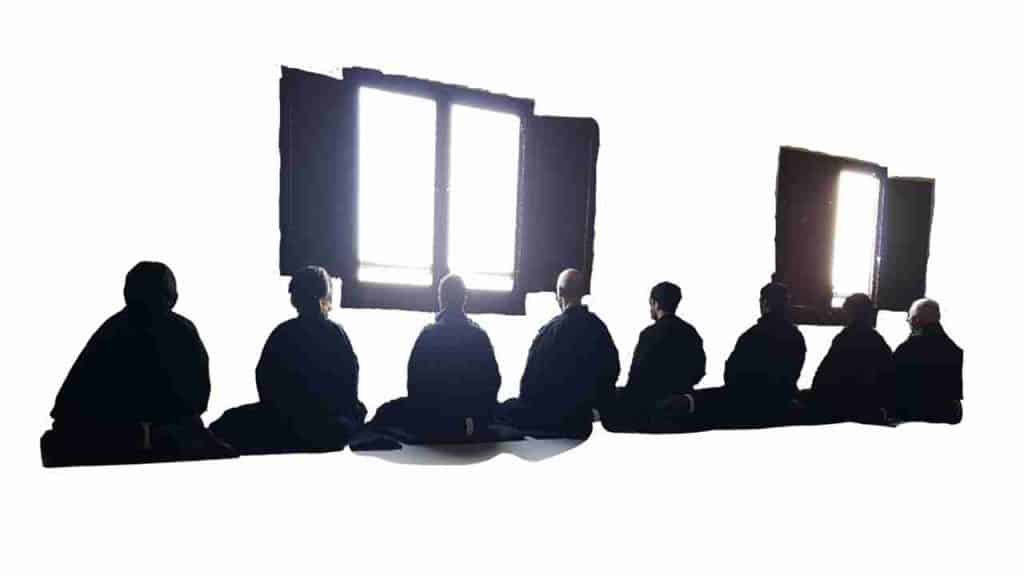
Sign up or get information about the next retreat:
Next zen meditation retreats in the mountain
2026/08/01 Zen Meditation Retreat. Ango from August 1 to 9.
2026/12/05 Zen meditation retreat in December in Lluçà: Rohatsu Zen.
Next zen meditation retreats in the city
2026/02/14 Zazenkai. February Retreat in Barcelona. Zen Meditation Zazen
2026/03/14 Zazenkai – March Retreat in Barcelona – Zen Meditation, Zazen
2026/05/02 Zazenkai. May Retreat in Barcelona. Zen Meditation Zazen
2026/06/13 08h Zazenkai. June retreat in Barcelona
2026/09/19 08:30 Urban Zen Meditation Retreat. From September 19 to 20.
2026/10/10 08h Intensive Zazen Meditation. October
2026/11/14 08h Retreat in November in the city. Weekend of 14th to 15th November.
2026/12/30 Year-End Meditation one day Retreat
2027/01/16 January zen retreat in the city. From January 16 to 17.
Why do a Zen meditation retreat?
Doing a meditation retreat offers multiple benefits. Meditation helps you focus, step away from distractions, and create an ideal environment for self-reflection. Additionally, retreats foster a connection with other practitioners, which can enrich the experience and provide mutual support.
Retreats also help revitalize Zen practice, preventing it from becoming a monotonous routine. By participating in activities in silence and focusing on mindfulness, attendees may experience greater mental clarity and calm. This is especially valuable in a world full of stress and distractions.
Finally, retreats are a great opportunity. You can learn from experienced teachers, such as Lluís Nansen Salas. They offer advice and techniques that can improve your personal practice.
In summary, a meditation retreat is a great idea. It enhances mental and emotional well-being. It can change how you practice meditation daily and influence your everyday life.
Is it better to do the retreat alone or with a group guided by a teacher?
The decision to do a retreat alone or in a group depends on individual preferences and needs. A solo retreat is easy to improvise; you can do it whenever the opportunity arises. It will give you moments of introspection and the chance to connect with yourself without external distractions. You can set your own pace, choose your meditation moments, and reflect on your thoughts and emotions in a peaceful environment.
However, it’s important to recognize that when meditating alone, we often encounter our own limits. We fall into the old traps of the ego, and in the end, it may feel like we are going in circles.
On the other hand, a retreat guided by a teacher and accompanied by a group allows us to go beyond our current limits. The presence of other participants creates a sense of community and support. Additionally, an experienced teacher can provide valuable guidance, helping attendees deepen their practice and overcome obstacles that may arise.
Group dynamics can also foster an atmosphere of motivation and commitment, which can be especially helpful for those who are just starting their meditation journey.
Whether in solitude or with company, the essential thing is to dedicate time to meditation and self-discovery.
Each experience can offer unique lessons and contribute to your personal growth. So, why not explore both options and see which one benefits you more on your meditation journey?
What if I can’t handle the meditation retreat?
Don’t worry if you feel that a meditation retreat might be too intense or overwhelming at first. You might not be used to sitting with your legs crossed or practicing this type of meditation. Keeping a beginner’s mind will help.
Doubts and concerns about the duration and commitment involved are completely normal. You can start with shorter sessions, either at home or at a city retreat center. The key is to allow yourself to experience meditation at your own pace.
Remember, every moment you dedicate to practice counts, and each attempt is a step toward greater self-awareness and well-being. Even if you have to sit in a chair because you have chronic pain just inhale and exhale in silent meditation and your state of mind will change.
Zen is a form of meditation that aids with mind wandering and reduce stress. Unless other meditation techniques, or guided meditations, its just paying attention at everything appearing in the mind and body.
Meditation is a personal journey, and everyone has their own lifestyle. Be kind to yourself and enjoy any meditation session in the daily routine. For a zen buddhist, even a short period of walking meditation is a chance to awake the mind.
How do I prepare for a Zen retreat?
To prepare for a Zen retreat, it’s important to take some time to reflect on your intentions. Ask yourself what you hope to gain from the experience and what aspects of your life you’d like to explore more deeply. Once you have clarity on your goals, start researching the place where you’ll be doing the retreat. Look into the daily structure and the rules that will be followed. This will help you get an idea of what to expect and feel more comfortable.
Additionally, it’s recommended to practice meditation at home before attending the retreat. Dedicate a few minutes each day to sitting in silence, focusing on your breath, and observing your thoughts without judgment. This will help you familiarize yourself with the practice and make it easier to adapt to the retreat environment.
Preparing your body and mind is also important. Try to maintain a healthy diet in the weeks leading up to the retreat and make sure to get enough rest. Meditation can be intense, and being in good physical and mental shape will help you make the most of the experience.
Finally, keep an open and receptive attitude. Every retreat is unique and can offer unexpected lessons. Allow yourself to feel and experience hatever arises, without clinging to expectations. Remember, the goal is personal growth and connection with yourself.
For more information on how to prepare to retreat in catalonia read this blog: https://zenkannon.org/en/preparing-retreat/


